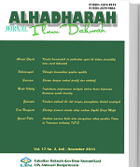
Publication Ethics
Ethical Guidelines for Journal Publication
This statement sets out the ethical standards for all parties involved in publishing an article in Alhadharah: Jurnal Ilmu Dakwah, including authors, editors, peer reviewers, and the publisher. These guidelines are based on the COPE Best Practice Guidelines for Journal Editors.
Ethical Standards for Journal Publication
Publishing in a double-blind peer-reviewed journal like Alhadharah: Jurnal Ilmu Dakwah plays a crucial role in building a respected body of knowledge. It reflects the quality of the authors' work and the supporting institutions, highlighting the importance of maintaining high ethical standards.
UIN Antasari Banjarmasin, as the publisher of this journal, is committed to overseeing all stages of publishing with integrity. We ensure that advertising, reprints, or other commercial revenue do not influence editorial decisions, and we support communications with other journals or publishers as necessary.
Editorial Responsibilities
Publication Decisions
Editors are responsible for deciding which submitted articles should be published in Alhadharah: Jurnal Ilmu Dakwah. These decisions should be based on the article’s validity, relevance, and importance to researchers and readers, guided by the journal’s policies and ethical considerations, including legal requirements concerning libel, copyright infringement, and plagiarism.
Fair Play
Editors evaluate manuscripts purely on their intellectual content, without discrimination based on race, gender, sexual orientation, religious belief, ethnic origin, citizenship, or political philosophy of the authors.
Confidentiality
Editors and editorial staff must keep all information about submitted manuscripts confidential, sharing details only with the corresponding author, reviewers, potential reviewers, and other editorial advisers when necessary.
Disclosure and Conflicts of Interest
Editors must not use unpublished materials from submitted manuscripts in their own research without explicit written consent from the authors.
Reviewer Responsibilities
Contribution to Editorial Decisions
Peer reviewers help editors make publication decisions and provide feedback that can assist authors in improving their manuscripts.
Promptness
Reviewers who feel unqualified to assess a manuscript or unable to provide a prompt review should inform the editor and withdraw from the review process.
Confidentiality
Manuscripts received for review must be treated as confidential. Reviewers must not share or discuss these manuscripts with others unless authorised by the editor.
Objectivity and Standards
Reviews should be objective, constructive, and free of personal criticism. Reviewers should express their opinions clearly, supported by evidence and logical reasoning.
Acknowledgement of Sources
Reviewers should identify relevant published work that has not been cited by the authors and alert the editor to any significant similarity between the manuscript under consideration and any other published work they are aware of.
Disclosure and Conflicts of Interest
Information obtained through peer review must be kept confidential and not used for personal advantage. Reviewers should not review manuscripts in which they have conflicts of interest arising from competitive, collaborative, or other relationships with any of the authors, companies, or institutions involved.
Author Responsibilities
Reporting Standards
Authors should present an accurate account of their research, providing a detailed, objective discussion of its significance. The manuscript should include enough information to allow others to replicate the research. Fraudulent or knowingly inaccurate statements are unacceptable and considered unethical.
Data Access and Retention
Authors should be prepared to provide raw data for editorial review and public access if practicable, and they must retain such data for a reasonable time after publication.
Originality and Plagiarism
Authors must ensure their work is original. If they have used the work or words of others, this must be appropriately cited or quoted.
Multiple, Redundant, or Concurrent Publication
Authors should not publish the same research in more than one journal. Submitting the same manuscript to more than one journal concurrently is unethical.
Acknowledgement of Sources
Proper acknowledgement of others' work must be given, and authors should cite publications that have influenced their research.
Authorship of the Paper
Only those who have significantly contributed to the research should be listed as co-authors. The corresponding author must ensure that all co-authors approve the final version of the paper and agree to its submission.
Hazards and Human or Animal Subjects
Authors must clearly identify any unusual hazards associated with chemicals, procedures, or equipment in their manuscript.
Disclosure and Conflicts of Interest
Authors must disclose any conflicts of interest that could influence their research findings, including financial support for their project.
Fundamental Errors in Published Works
If an author discovers a significant error in their published work, they must promptly inform the journal’s editor and cooperate in correcting or retracting the paper.






